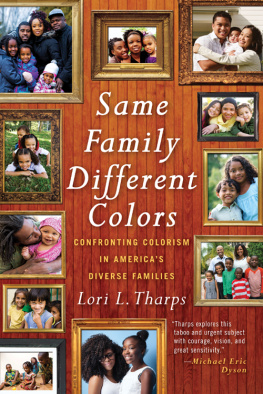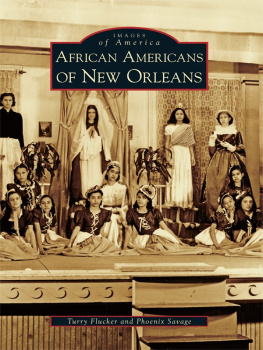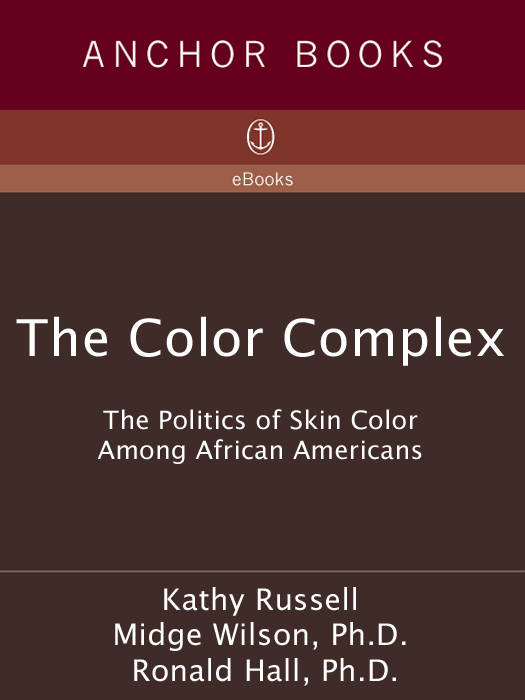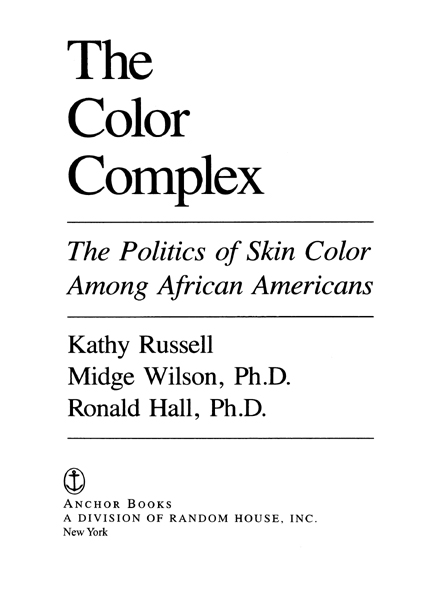First Anchor Books Edition, November 1993
Copyright 1992 by Kathy Y. Russell, Midge Wilson, and Ronald E. Hall
All rights reserved under International and Pan-American Copyright Conventions. Published in the United States by Anchor Books, a division of Random House, Inc., New York, and simultaneously in Canada by Random House of Canada Limited, Toronto. Originally published in hardcover in the United States by Harcourt Brace Jovanovich in 1992. The Anchor Books edition is published by arrangement with Harcourt Brace Jovanovich.
Anchor Books and colophon are registered trademarks of Random House, Inc.
The names of some of the people who appear in this book, along with details of their lives, have been changed to protect their privacy. Each such instance is noted in the text the first time the person appears.
Library of Congress Cataloging-in-Publication Data
Russell, Kathy.
The color complex: the politics of skin color among African
Americans/Kathy Russell, Midge Wilson, Ronald Hall.1st Anchor Books ed.
p. cm.
1. Afro-AmericansRace identity. 2. Black raceColorSocial aspectsUnited States. I. Wilson, Midge. II. Hall, Ronald E. III. Title.
[E185.625.R79 1993]
305.896073dc20 93-13294
eISBN: 978-0-307-80675-8
www.anchorbooks.com
v3.1
This book is dedicated
to Kathys mother, Dorothy C. Russell,
and Midges husband, Shaun D. Reynolds,
for their unwavering love and support.
Contents
Introduction
Too many blackfolks are fools about color and hair.
M ABEL L INCOLN , interviewee in Drylongso:
A Self-Portrait of Black America,
by John Langston Gwaltney
I ntraracial color discrimination is an embarrassing and controversial subject for African Americans. While many prefer not to discuss it, especially in the company of Whites, others contend that skin color bias no longer existsthat its history, water over the dam. Yet beneath a surface appearance of Black solidarity lies a matrix of attitudes about skin color and features in which color, not character, establishes friendships; degree of lightness, not expertise, influences hiring; and complexion, not talent, dictates casting for television and film. In the world of entertainment, a Black superstar has surgically altered his features to the point where he no longer looks Black. Delve a little deeper, and you will find a reservoir of guilt and anger that threatens to overflow, exposing to African Americans the truththat skin color still matters.
During the 1980s Black filmmaker Spike Lee directed, produced, and starred in a musical, School Daze, about obsession with skin color on a Black college campus. Although he was criticized by some members of his own community for airing their dirty laundry, Lee returned to the subject in Jungle Fever, which also explored the passions of interracial sexual liaisons. In Jungle Fever, a dark-skinned Black man named Flipper (Wesley Snipes) is happily married to a lighter-skinned Black woman, Drew (Lonette McKee), until he becomes sexually involved with his White secretary, Angie (Annabella Sciorra). When Drew discovers the affair her temper flares, not so much because her husband has been unfaithful but because he has been unfaithful with a White woman. In a pivotal scene, she rails:
What I mean is youve got a complex about color. Youve always had it. I never wanted to believe it until now. I told you what happened to me when I was growing up I told you how they called me high yella, yellow bitch. White honky, honky white, white nigger, nigger white, octoroon, quadroon, half-breed, mongrel
In telling Flipper he has a complex about color, Drew is accusing him of an old prejudice among Blacks, a prejudice she knows intimately because she looks White.
Traditionally, the color complex involved light-skinned Blacks rejection of Blacks who were darker. Increasingly, however, the color complex shows up in the form of dark-skinned African Americans spurning their lighter-skinned brothers and sisters for not being Black enough. The complex even includes attitudes about hair texture, nose shape, and eye color. In short, the color complex is a psychological fixation about color and features that leads Blacks to discriminate against each other. Because the color complex has long been considered unmentionable, it has been called the last taboo among African Americans.
The color complex may reveal itself in a variety of ways wherever Blacks come togetherin families, at work, in social situations. An uncensored comment may slip unexpectedly into a conversation, wreaking emotional havoc. An insensitive relative may criticize a Black child for having a nappy head. A Black supervisor may create tension in the office by harping on a subordinates lighter skin color, saying he or she has had it too easy. The revelation of a hidden bias may even bring a promising relationship to an end, as when one attractive medium-toned Black woman in her twenties discovered that the man she had fallen in love with had a problem with her color.
It was our third date, and following a romantic dinner, over dessert, I caught what I thought was Carls approving gaze. Demurely, I inquired, Whats making you smile so? You know, he paused and then continued, youre pretty smart and youre a lotta fun but I just cant get too serious with a dark-skinned woman. Its important to me to have light-skinned children. I watched as he then casually stuffed in his mouth the last piece of vanilla cream pie laden with chocolate sauce. My own dinner churned inside while the blood rushed to my face. I felt like the blackest, ugliest sister alive, and hated him for making me feel that way. With all the dignity I could muster, I got up, and walked across that restaurant and out the door.
Whites who are unaware of the color complex may be puzzled when they first encounter it. One White therapist recalls her initial confusion when a young Black female client began describing her painful home life, all the while nervously twisting and knotting her long, thick black hair.
My sisters hate me, she cried. But it is not my fault. When company comes over, my Papa, whos so proud of this long, straight hair of mine, makes me come sit in the dining room with him and his friends. My sisters, who have kinda short n nappy hair, have to stay in the kitchen. Im sorry, I dont understand, the therapist said. She further explained, He likes to show me off, like Im some sorta trophy or something. The thing is, I hate my hair. She sobbed, Id rather my sisters liked me.
Most Blacks are careful about letting Whites in on their dirty little secret. But Whites ought not to be isolated from the concerns of Blacks, especially since they so often have the power to hire, promote, appoint, and elect them. In a multicultural society like our own, justifications for hiding the color complex no longer hold weight. Blacks and Whites regularly attend school together, work in the same offices, and share the same neighborhoods. Ignorance of anothers culture only breeds racism.
It is wise to remember that prejudice of any kind creates systems of privilege as well as oppression. Skin-color bias is no different; while many Blacks are hurt by colorism, others benefit from it. In todays climate of political correctness, it is downright fashionable to be able to claim the status of a victim. Yet often the individual members of an oppressed group conveniently ignore the benefits they may receive from simultaneous membership in another group. For example, if a White female incessantly complains about sexism without acknowledging the privilege that comes from being White, she misses the larger issue. Similarly, if light-skinned, keen-featured Blacks talk only of prejudice from Whites, without examining how their own color and features grant them social and economic advantages, both within and outside their own community, they, too, risk perpetuating a social hierarchy based on appearance.













